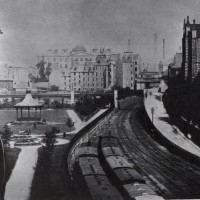Voice’s Old Susannah tackles more tricky terms with a locally topical taste ( but do bear with her …. I believe some lengthy, yet justified aeriation may preclude ).
Congratulations to Ms Valerie Watts, formerly of Chief Executive of Derry; she will become the third Aberdeen City Chief Executive in as many years. Readers who can remember back as far as 2008 will recall Douglas Paterson taking early retirement. This was coincidentally just before Audit Scotland came to call, and just after he said he would not leave his post over the little matter of being at the helm when the City sold off various properties for a fraction of their market value.
Nothing to do with him. The auditors were unable to conclude whether these sales – some £5 million less than conservative market value – were a great idea, incompetence, or possibly even shady. For instance, the City claimed to believe it was selling property to the NHS, but sold it to a private developer. If only there had been someone who was invovled with both the City Council and the NHS. Granted Kate Dean would have been one of the most senior people Old Susannah can think of involved with both these entities, but she would have been too busy to notice a deal worth a mere few millon.
Next in the Chief Executive office was Ms Bruce, who left us for Edinburgh, claiming she brought us to a £9 million budget surplus. It actually looks like we need to make about £90 million budget savings immediately, but all the best to her.
Ms Watts may have to get a part-time job to make ends meet; the post of Chief Exec of our fair city only pays £141, 834, with 5% based on how well they perform. Then again, she will want to take a 5% pay cut (that’s about £22K) to show solidarity with the City Council workers who have happily agreed to such a cut themselves. While it may be true that the UK Prime Minster and his cabinet ministers all earn less than our City Chief Exec, they won’t have nearly as much responsibility as Ms Watts, who will need to meet heads of state, tell the Queen what to say in her speech, and build shopping malls and community stadiums.
A person could make a few comparisons between Aberdeen and Derry. For a start the population figures are similar – Derry c. 237,000 and per an Aberdeen report “In the period up to 2031, the population of Aberdeen City is forecast to rise to a peak of 215,000. Both cities have airports as well as countryside areas. Derry had a budget surplus of just over £1 million in 2008, and, well Aberdeen was in the red by tens of millions for the same period. Derry however has a biodiversity policy which has seen it take important ecological steps, and financially speaking it reported an income from its services of £9,140,000 and rates earned it 38,717,000 circa 2008. Obviously Ms Watts has a lot to learn about local developers and what should be done with greenbelt land.
This is most impressive, but clearly can’t work in Aberdeen – we have builders to look after
If anyone can penetrate the Aberdeen City Council finances and find out more than Old Susannah can as to how we compare to Derry financially, I would love to hear from you.
Clearly they have skimped on hospitality, new office furniture, travel, and clothing to make its Lord Provost (actually mayor in Derry) look good. We managed to write off about £11 million in bad debts in a similar period, sold real estate to developers for a fraction of its actual value, and continued to have a discrepancy in pay women earned compared to their male counterparts.
Ms Watts won’t be used to such creativity. Rumour has it that Derry’s schoolchildren still have things like small classes and music lessons – but this is unconfirmed.
Looking again at the two cities and how they regard the environment, Derry has something called a ‘Local Biodiversity Plan’, which reads in part:
“Derry City Council is further meeting its corporate objectives by protecting and enhancing biodiversity in rural and urban areas, and thus providing a clean, diverse, accessible and sustainable environment for people to enjoy while also looking after the health and well being of its communities.
“Natural habitats are being compromised as development progresses in Northern Ireland and in the Northwest. Many species are now living in much smaller fragmented pockets of their previous habitat range. These islands of good habitat are more vulnerable to population decline. Developments of new housing schemes, industrial estates, commercial premises and office space in urban and rural areas, new transportation infrastructure, infilling… are all contributing to habitat loss and fragmentation in the area. Construction projects alongside or close to waterways are particularly sensitive and potentially damaging to flora and fauna”.
This is most impressive, but clearly can’t work in Aberdeen – we have builders to look after, don’t you know?
I can think of nothing that would succeed more than a luxury goods store on Vicky Road
Necessity: Necessity is defined as experiencing a lack of a desired or essential commodity. As anyone in genuine need can tell you, necessity is also a mother.
Aberdeen suffers from need; we identified the necessity of an £80 million pound re-fit for Marischal College for Council offices, and we met that need with new furniture – also necessary. Some things are luxuries, or can be described as ‘nice to have’.
In our City these include road surfaces, services for the disabled, help for the elderly, sports facilities, reasonably-sized classes for students, parks and music lessons.
And as our high-street stores close one by one, there is another thing we need….
Retail Rocks! Retail Rocks is a private company that will bring new life back to Torry’s boarded up shops as well as a few other closed business premises here and there. Clearly the closed down toy store and art materials shop near Bon Accord, ‘Globally Sweet’ on Union Street, and a dozen shops on Holburn closed as the owners were just too lazy or were bad managers. After all, Scottish Enterprise was always on hand to help, and at a cost to the taxpayer of £700 million a year – that is a lot of help. However, there is only so much that a small, unelected quango can accomplish, and Retail Rocks has stepped in to help enterprise in Scotland where Scottish Enterprise could not.
How hard in those conditions can it be to compete with international chain stores
It was not as if the rates in Aberdeen are astronomically high, or that there are not enough police to stop robberies (I can only think of two knife attacks in Torry stores in the last year or two, so that’s not so bad is it?) or to stop the occasional drunk breaking shop windows.
Theft is certainly not an issue – unless you count the dozens of stories in the press each month (and my favourite, the ‘hoodie’ who robbed the Torry PDSA charity shop last Christmas). Seeing as the citizens of Aberdeen have so much expendable income, I can think of nothing that would succeed more than a luxury goods store on Vicky Road. It’s only laziness that stops the family corner shop from completing the one or two bits of paperwork needed for tax, insurance, sales, licensing, transport and so on.
How hard in those conditions can it be to compete with international chain stores, one or two of which you may notice dotted around our town? Aside from their centralised administration, bulk buying power, brand recognition, control of suppliers and use of enterprising children in Asia to produce cheap goods, they really don’t have much of a competitive edge.
Soon the streets will be wholly regenerated with a dozen or so new shops for the ‘Retail is Rocky’ – I mean the ‘Retail Rocks’ competition winners. Get your groundbreaking idea in now. You could wind up a shopkeeper. With the recession in full bloom, there is only one way to go and that is up, and with VAT at 20%, it is easier to calculate it when it was 17.5%. Good luck to all of you – and remember to install security cameras and metal shutters.
Next week: more of the City Council’s committees, ‘conflict of interest’, and ethics


